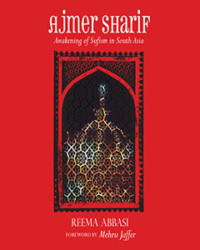Sufi books
At a time when international politics is dominated by talks about terrorism — inevitably equated with Islam and influential leaders are spewing hatred, it is heartening to come across two books linked to Sufism —Rumi’s Secret: The Life of the Sufi Poet of Love and Ajmer Sharif. Sufism is a mystical branch of Islam though all orders trace their origins back to Prophet Mohammed. It is a form of Islam which believes in spreading the message of love. Two of the most famous practitioners were Muinuddin Chishti (1141 – 1236) who established the Chishti order of Sufism in India and the second is Jalāl ad-Dīn Muḥammad Balkhī or Rumi (30 September 1207 – 17 December 1273) as he is more popularly known.
The biography of Rumi by Brad Gooch, New York Times bestselling author is a fascinating blend of part-memoir, part biographical and a bit of translation. Brad Gooch explains how he became familiar with Rumi and decided to write his biography but only after he had learned Persian well enough to read the original texts. So many of the passages translated into English and published in the book were done by Brad Gooch himself. Rumi got his name as he spent much of his adult life in Turkey which in the 13th century was part of the Byzantium empire. So “Rumi” is a corruption of “Rome”. There is a comfortably gentle style of storytelling that describes Rumi’s childhood, his move from Balkh to Turkey, his poetry, the violence of Chenghiz Khan, his personal life and finally his funeral which was attended by leaders of all other religions. This biography has an equally significant narrative about Brad Gooch’s own engagement with the poet and this beautifully intertwined with the factual account of Rumi’s life. This account highlights how these two lives may be separated by a few centuries but Rumi’s poetry and philosophy remains incredibly relevant in the twenty-first century. It would have probably enriched the book considerably if pictures had been tipped in of paintings, manuscripts and places associated with the poet.
 Ajmer Sharif is an illustrated history about the dargah of Muinuddin Chishti written by Reema Abbasi. It is not only an account of the Sufi giant but also consists of accounts of his more prominent disciples such as Jahanara, the eldest daughter of Mughal emperor, Shah Jahan. The book is packed with elaborate descriptions of the buildings, the lineage, the rituals and customs, the significant festivals observed and of course, some of the violent history associated with Ajmet at the time of establishing the sect in India. It is estimated that more than 150,000 people visit the shrine every day. It must be quite an administrative achievement to ensure the smooth functioning of such an important shrine. Though the book while focusing on the mysticism and impact the Sufi saint has had upon devotees for centuries it sadly glosses over the administrative structures put in place soon after Independence wherein it is managed by the Dargah Khwaja Saheb Act, 1955 of the government of India. The book contains more than 200 images but alas they do little to enhance the narrative sufficiently. The pictures are not of very high resolution, clarity or strong compositions and it transpires many have been used from Wikipedia. ( The links are provided.) Despite the shortcomings of not having high quality photographs to accompany the text Ajmer Sharif is a decent introduction to such a significant shrine.
Ajmer Sharif is an illustrated history about the dargah of Muinuddin Chishti written by Reema Abbasi. It is not only an account of the Sufi giant but also consists of accounts of his more prominent disciples such as Jahanara, the eldest daughter of Mughal emperor, Shah Jahan. The book is packed with elaborate descriptions of the buildings, the lineage, the rituals and customs, the significant festivals observed and of course, some of the violent history associated with Ajmet at the time of establishing the sect in India. It is estimated that more than 150,000 people visit the shrine every day. It must be quite an administrative achievement to ensure the smooth functioning of such an important shrine. Though the book while focusing on the mysticism and impact the Sufi saint has had upon devotees for centuries it sadly glosses over the administrative structures put in place soon after Independence wherein it is managed by the Dargah Khwaja Saheb Act, 1955 of the government of India. The book contains more than 200 images but alas they do little to enhance the narrative sufficiently. The pictures are not of very high resolution, clarity or strong compositions and it transpires many have been used from Wikipedia. ( The links are provided.) Despite the shortcomings of not having high quality photographs to accompany the text Ajmer Sharif is a decent introduction to such a significant shrine.
Sufism is a very influential philosophy and people of all faiths gravitate towards it. They approach it in myriad ways — whether by its poetry, music, beliefs etc. Ultimately it is a belief which for its main tenet of preaching love is revered worldwide. It has withstood the test of time over many centuries surviving through some tumultous epochs as well. Maybe its time for contemporary politicans who spread communal hatred to read Sufi literature.
10 February 2017

No Comments